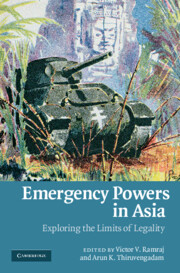Book contents
- Frontmatter
- Contents
- List of contributors
- Preface
- 1 Introduction: emergency powers and constitutionalism in Asia
- PART I Perspectives from legal and political theory
- PART II Postcolonial and post-conflict transitions
- PART III Emergencies, executive power and constitutional order
- 10 Emergency powers and the rule of law in Indonesia
- 11 Emergency powers with a moustache: special powers, military rule and evolving constitutionalism in Thailand
- 12 Emergency powers and the limits of constitutionalism in Japan
- 13 States of exception in an exceptional state: emergency powers law in China
- PART IV The role of the courts
- Index
- References
10 - Emergency powers and the rule of law in Indonesia
from PART III - Emergencies, executive power and constitutional order
Published online by Cambridge University Press: 04 August 2010
- Frontmatter
- Contents
- List of contributors
- Preface
- 1 Introduction: emergency powers and constitutionalism in Asia
- PART I Perspectives from legal and political theory
- PART II Postcolonial and post-conflict transitions
- PART III Emergencies, executive power and constitutional order
- 10 Emergency powers and the rule of law in Indonesia
- 11 Emergency powers with a moustache: special powers, military rule and evolving constitutionalism in Thailand
- 12 Emergency powers and the limits of constitutionalism in Japan
- 13 States of exception in an exceptional state: emergency powers law in China
- PART IV The role of the courts
- Index
- References
Summary
Introduction
While Indonesia has had experience in dealing with the use of emergency powers for more than fifty years, it has had to face severe problems that have challenged its goals of national resilience, development and, more importantly, the absence of the rule of law. The focus of my chapter is the tensions inherent between emergency powers and the rule of law in Indonesia, particularly in the post-Suharto era.
From 1998 Indonesian politics has progressed to a fully functional democratic system: all political parties can easily participate in general elections for the Parliament and for the office of the President. There is no restriction placed on establishing new political parties. Contrary to previous years, the military, at least ostensibly, is not involved in the political realm. The 2004 General Election in Indonesia was illustrative. The Indonesian people exercised their constitutional rights to rotate elites, to select leaders and to express grievances and desires, in free and fair elections.
Despite Indonesians' willingness to embrace the processes of democracy, as the biggest Muslim country in the world Indonesia has also faced the problems of terrorism, such as in the Bali bomb blasts of 12 October 2002, the attack on the JW Marriott hotel in Jakarta in 2003, and the further one against the Australian embassy in 2004. Indonesians were shocked when they found that foreign tourists had become the targets of terrorism.
- Type
- Chapter
- Information
- Emergency Powers in AsiaExploring the Limits of Legality, pp. 267 - 293Publisher: Cambridge University PressPrint publication year: 2009
References
- 1
- Cited by



